When products make claims about their supposed benefits, we often don’t believe them immediately. We look for proof and carefully examine the information. This is especially true when it comes to medications and supplements that we put inside our body. Lucky for us, consumers, regulatory authorities and laws prevent companies from making incredulous claims for their products. So when we see claims like Pynocare as a melasma solution, we immediately look for clinical trials to back such claims.
One study was actually conducted here in the Philippines with Filipino women as subjects. So, when you take Pynocare as a melasma solution for your melasma concerns, you are also exposed to the same external conditions (weather, environment, etc.) as to the subjects in the study.
The Study
The particular study backing up Pynocare as a melasma solution was conducted Dr. Evangeline Handog and colleagues. They aimed to assess the safety and efficacy of oral procyanidin + vitamins A, C, and E among Filipino patients with epidermal melasma.
The Subjects
The study involved 60 adult females with bilateral epidermal melasma. They received either the test drug containing procyanidin + vitamins A, C, and E, or a placebo. The test drug contains 24 mg of procyanidin, 6 mg of beta carotene, 60 mg of ascorbic acid, and 15 IU of d-alpha-tocopherol acetate. Meanwhile, the placebo contains starch identical in appearance to that of the test drug.
The drug and placebo are given twice a day with meals for a period of 8 weeks.
Safety evaluations were conducted prior to and at each follow up visit of the patients.
Methods
The study is a randomized, double blind, placebo-controlled study. This means that the researchers and patients have no information if they receive the drug containing the ingredients being studied or a placebo. This eliminates bias in studies like this and ensures that the results are valid.
Effects in terms of changes in pigmentation were measured using a mexameter, melasma area and severity index (MASI), and global evaluation of the patient and the researchers.
- Mexameter: A mexameter is an instrument used to measure the absorption or reflection of light. Values range from 1 to 1000, with zero representing white and 1000 representing black. In the study, the mexameter values provide an estimate of the melanin and hemoglobin (erythema) content of the This means that patients with higher mexameter readings have essentially darker melasma pigmentation.
- Melasma Area and Severity Index (MASI): The MASI scores of the patients were calculated based on the area of involvement, darkness of melasma, and homogeneity of pigmentation. Four areas on the face were evaluated: forehead, right malar (right cheek) region, left malar (left cheek) region, and chin, which represented 30%, 30%, 30%, and 10% of the face, respectively.
- Subjective evaluation of patients and researchers: At the end of the study, both the patients and researchers filled out an evaluation form based on their subjective assessment on the improvement of their They were asked if they think that their/their patients’ melasma has “no improvement”, “slight improvement”, “moderate improvement”, “obvious improvement”, or “very marked improvement”.
Results
Of the 60 patients, only 56 completed the 8-week trial (27 from the treatment group and 29 from the placebo group). Out of the 4 who dropped out, only one dropped out due to adverse effects, and the rest simply failed to show up during follow up.
- Mexametry Results: The average melanin index of the patients in the treatment group showed significant decrease in both the left and right malar (cheeks) region at weeks 4 and 8.
- MASI Scores: Similarly, the MASI scores of those in the treatment and placebo group also showed significant improvement.
- Subjective evaluation scores: In the subjective evaluation conducted by the researchers, the treatment group showed moderate to obvious clinical The evaluation of the patients, however, showed a more diverse result from slight to moderate to obvious clinical improvement. Meanwhile, for the placebo group, the researchers’ evaluation showed no to slight improvement, and patients’ evaluation ranges from no to moderate improvement.
Adverse Effects
Procyanidin + vitamins A, C, and E was proven to be safe and well-tolerated. Blood chemistry, abdominal ultrasound, electrocardiography (ECG) were conducted and found to be in normal limits before and after each phase of the study.
In a similar study conducted in 2004, where they evaluated 80 mg of procyanidin for 30 days, adverse effects included headache, dizziness, diarrhea, and fatigue in a minority of the participants. However, the study conducted here in the Philippines, none of those adverse effects were reported by the participants. Only one participant developed a metallic taste and subsequently dropped out from the study.
What does this all mean?
Randomized controlled trials (RCT) is regarded as the gold standard when it comes to evaluating the effectiveness of interventions. This study shows the effectiveness and safety of procyanidin + vitamins A, C, and E in combating melasma.
Procyanidin has been shown in the past to be a powerful antioxidant and possess anti-inflammatory properties. It was also shown to have collagen-stabilizing action that produces a sealing effect in fragile capillaries especially in those with inflammatory conditions. It also strongly suppresses the formation of melanin making it beneficial for treatment of melasma.
In addition, procyanidin has been shown to be several times more powerful than vitamins C and E in terms of their antioxidant activity. It can also recycle vitamin C and regenerate vitamin E, and increase the activity of the body’s natural antioxidant enzyme system.
The addition of vitamins A, C, and E, all known to be powerful antioxidants in their own rights makes for an ideal antioxidant powerhouse. Vitamin C can also rejuvenate vitamin E by providing a steady supply of reduced hydrogen that allows vitamin E to scavenge reactive oxygen species. This synergistic action is further enhanced by vitamin A.
Pynocare as a Melasma Solution
Knowing all that, you might be wondering how you can harness the power of procyanidin + vitamins A, C, and E for your melasma woes. The good news is that Pynocare contains all those active ingredients and is readily available in the Philippines.
Pynocare contains the same exact formulation as the one used in the study. It contains procyanidin 60 mg (as French maritime pine bark extract), ascorbic acid (vitamin C) 60 mg, betacarotene (vitamin A as D. salina extract) 6 mg, and d-alpha-tocopheryl acetate (vitamin E) 15 IU.
The recommended dosage is 1 capsule twice a day for 8 weeks preferable after breakfast and in the afternoon or as directed by your physician. Deeper melasma may take up to 12 weeks of continuous treatment to see significant results. Pynocare can also be taken 1 capsule once a day to prevent recurrence of melasma.
Staying vigilant
The fact that you are reading about this is proof that you are vigilant about what you use and put in your body. It is a good characteristic to have especially today where some companies and products are finding ways to circumvent the regulations that protect the public from false claims.
While the study sheds light on the positive impact of Pynocare on melasma, it is essential to approach medications and supplements with vigilance. Not all supplements are created equal, and their efficacy and safety can vary widely. It is crucial for us to be informed consumers, scrutinizing the ingredients and researching the credibility of the supplements we consider incorporating into our routines.
Consulting with healthcare professionals before introducing new medications and supplements can provide personalized guidance, ensuring we make choices that align with our overall health goals. Staying vigilant in selecting supplements enhances the likelihood of reaping the intended benefits while minimizing potential risks, contributing to a holistic approach to health and well-being.
References
- Handog, E. B., Galang, D. a. V. F., De Leon‐Godinez, M. A., & Chan, G. P. (2009b). A randomized, double‐blind, placebo‐controlled trial of oral procyanidin with vitamins A, C, E for melasma among Filipino women. International Journal of Dermatology, 48(8), 896–901. https://doi.org/10.1111/j.1365-4632.2009.04130.x
————————————————————————————————————————————————————————————–
PYNOCARE (Procyanidin + Ascorbic Acid + Betacarotene + d-Alpha-Tocopheryl Acetate)
The first and only oral medicine that is clinically proven to reduce Melasma or dark spots formation in just 8 weeks. Unlike creams, lotions, and gels, it has MSCC or Melasma Skin Clear Complexion Complex formulation that deeply penetrates the inner layers of the skin, to help normalize melanin levels, thus minimizing the appearance of dark spots in a short time.
Mega Lifesciences Limited Inc. or Mega We Care, is actively involved in helping millions of people have access to safe, effective, world-class quality nutritional & herbal supplements, OTC, and ethical products.

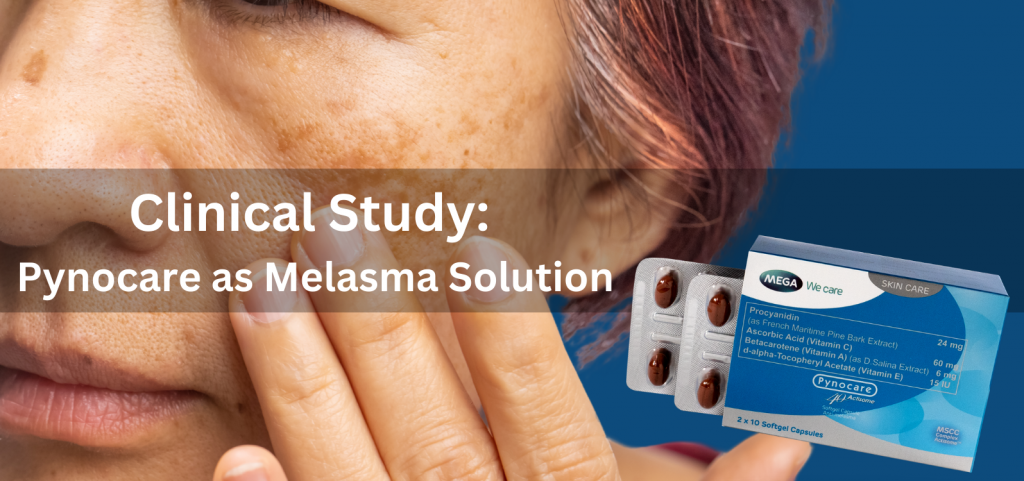
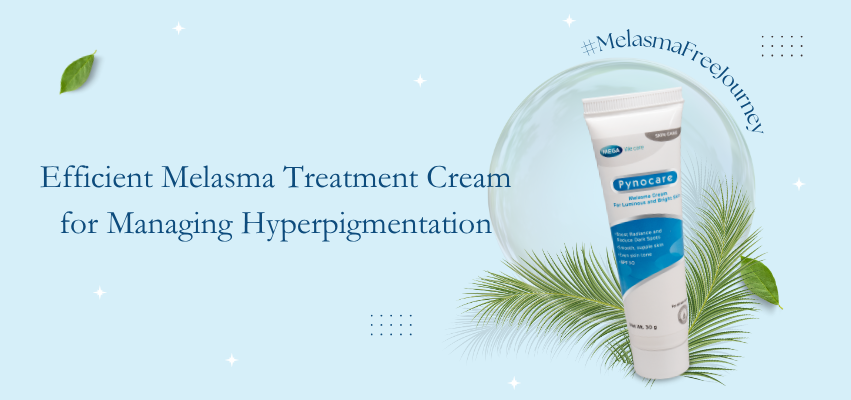
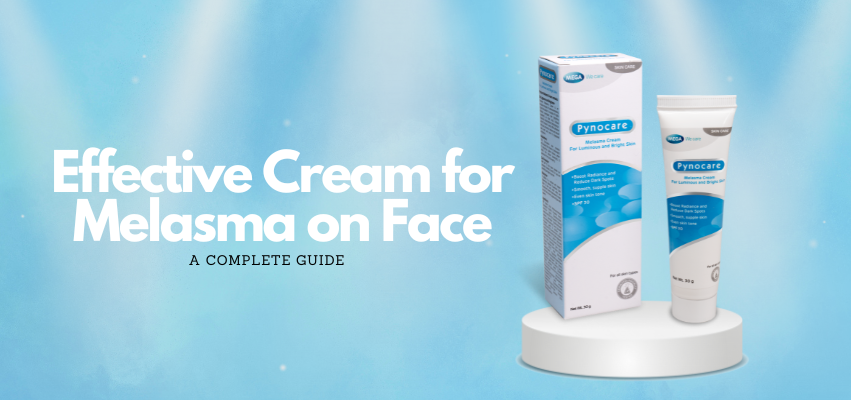
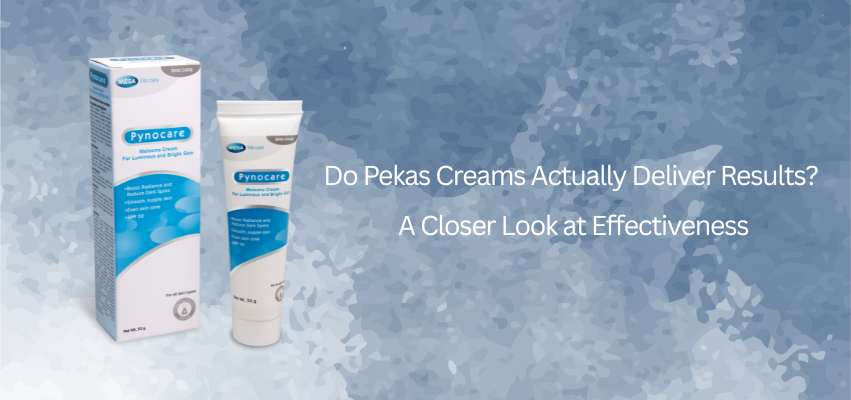


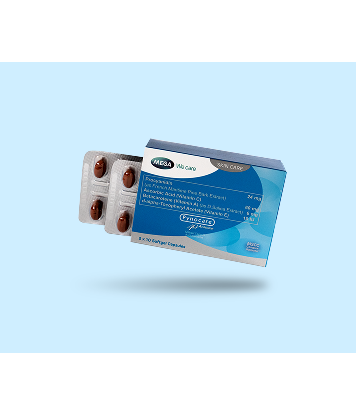













No Comments on Clinical Study: Pynocare as Melasma Solution